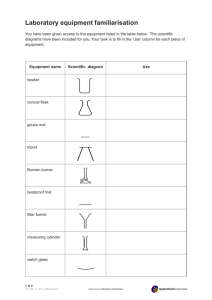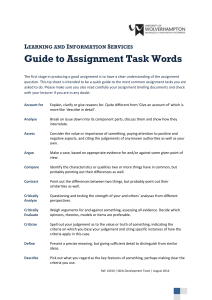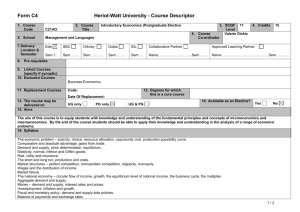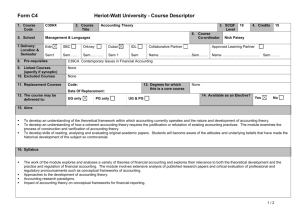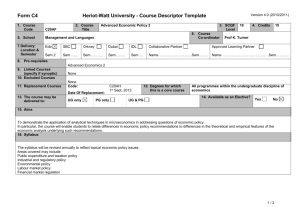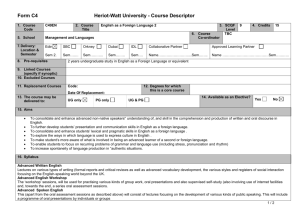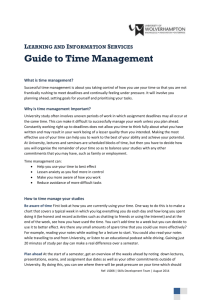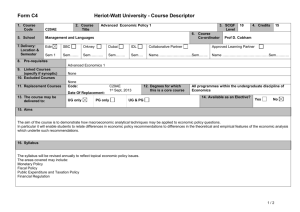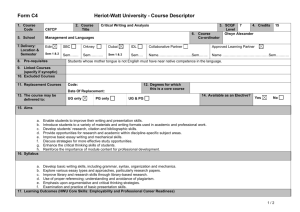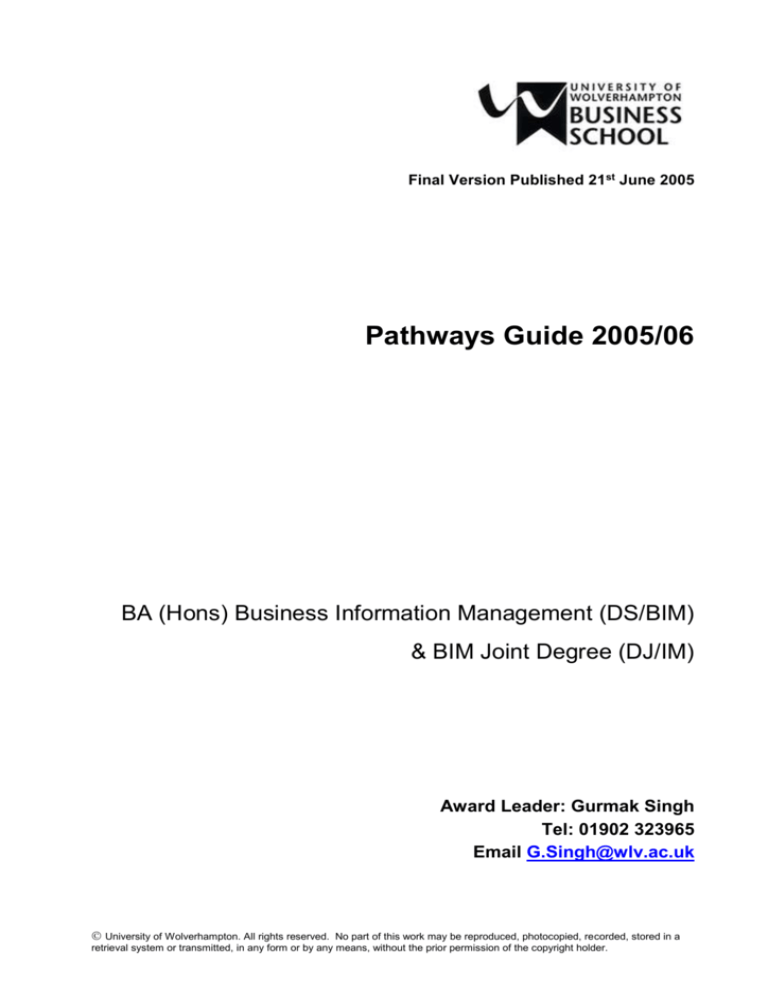
Final Version Published 21st June 2005
Pathways Guide 2005/06
BA (Hons) Business Information Management (DS/BIM)
& BIM Joint Degree (DJ/IM)
Award Leader: Gurmak Singh
Tel: 01902 323965
Email G.Singh@wlv.ac.uk
University of Wolverhampton. All rights reserved. No part of this work may be reproduced, photocopied, recorded, stored in a
retrieval system or transmitted, in any form or by any means, without the prior permission of the copyright holder.
BA (Hons) BIM & BIM Joint
Pathway 2005/06
Table of Contents
Welcome to the University of Wolverhampton Business School ........................................................... 3
Introduction to BA (Hons) Business Information Management Degree ................................................ 3
Programme Outcomes ............................................................................................................................... 4
Structure of the BA (Hons) Business Information Management ............................................................ 5
Level 1 Core Modules.................................................................................................................................. 6
AC1009 Introduction to Financial Management ......................................................................................... 6
EC1009 Economics for Business............................................................................................................... 7
HR1007 Learning and Development .......................................................................................................... 8
HR1009 Foundations of People Management ........................................................................................... 9
MK1004 Marketing Principles .................................................................................................................. 10
IM1006 Business Problem Solving .......................................................................................................... 11
Level 1 Elective Modules .......................................................................................................................... 12
IM1003 E-Business and Technologies .................................................................................................... 12
IM1005 Information Skills for Business .................................................................................................... 13
Level 2 Core Modules................................................................................................................................ 14
BA2006 Research Methods ..................................................................................................................... 14
BE2006 Business Planning & Decision Making ....................................................................................... 15
IM2004 Business Analysis ....................................................................................................................... 16
IM2005 Business Software Applications .................................................................................................. 17
IM2008 Systems for Management ........................................................................................................... 18
Level 3 Core Module Descriptions ........................................................................................................... 19
BE3017 Strategic Management in a Global Context................................................................................ 19
BE3021 Organisational Project ................................................................................................................ 20
IM3011 The UG Dissertation – Information Management ....................................................................... 21
IM3012 Business Decision-Making .......................................................................................................... 23
IM3013 E-Business Design ...................................................................................................................... 24
IM3014 People, Technology and Change ................................................................................................ 25
IM3015 The Information Age ................................................................................................................... 26
Introduction to the BA (Hons) BIM Joint Degree .................................................................................... 27
Programme Outcomes ............................................................................................................................. 27
Structure of the BA (Hons) BIM Joint Degree ......................................................................................... 29
Level 1 Core Modules................................................................................................................................ 30
IM1005 Information Skills for Business .................................................................................................... 30
Level 1 Elective Module ............................................................................................................................ 31
EC1006 International Business Environment........................................................................................... 31
Do You Want to be Successful? .............................................................................................................. 32
A Learning Route for Developing Your Personal Success Strategies and Creating a New Business
Venture..................................................................................................................................................... 32
BE1013 Entrepreneurs and Entrepreneurship ......................................................................................... 32
BE2021 Becoming an Entrepreneur ........................................................................................................ 32
BE3026 Creating and Starting a New Business Venture ......................................................................... 32
BE3027 Strategies for Building Business Success .................................................................................. 33
Supervised Work Experience – Module Code BE2010 .......................................................................... 33
Academic Staff - Areas of Interest ........................................................................................................... 34
Useful Information and Other Resources ............................................................................................... 34
1
BA (Hons) Business Information Management
& Business Information Management Joint Pathway 2005/06
e:Vision.....................................................................................................................................................34
WOLF .......................................................................................................................................................34
Student Support .........................................................................................................................................35
Management Team Contact Details .........................................................................................................36
Award Leader and Personal Tutor ...........................................................................................................36
UG Portfolio Administrator and UG Student Advisor................................................................................36
UG Portfolio Assistants ............................................................................................................................36
Registry Support Staff ..............................................................................................................................36
2
BA (Hons) Business Information Management
& Business Information Management Joint Pathway 2005/06
Welcome to the University of Wolverhampton Business School
On behalf of all the members of the University of Wolverhampton Business School (UWBS), and
in particular the Information Management subject staff; I would like to take this early opportunity to
extend a warm welcome to you.
Your Business Information Management (BIM) pathway is one of many run by UWBS which has
itself established an excellent reputation for high academic quality, friendliness and for its
supportive network of counsellors. Advice and support can be sought from a number of sources,
for further guidance please refer to the UWBS Student Support diagram and the Management
Team Contact Details later in this guide. We also believe it is important that you play your part in
the operation and development of your chosen pathway. We are therefore keen to hear your
views: and would welcome any suggestions that you may have about ways of improving any
aspect of your pathways and/or the student experience here at UWBS. In practice, you will have
the opportunity to do this through the process of student representation at Pathways Committee
meetings during each semester.
I wish you every success in your studies, and trust that your time at UWBS will prove to be
enjoyable, stimulating and rewarding.
Gurmak Singh, Award Leader.
Introduction to BA (Hons) Business Information Management Degree
Information Management deals with the relationship between business activities, individuals and
information systems within an organisation. The emphasis is not on information technology per
se, but on its role in business organisations in order to seek broad contextual understanding.
Information management crosses disciplinary and administrative boundaries.
Information
management focuses on designing and developing information management systems so that the
people can locate the most appropriate information associated with the organization decisionmaking.
The BIM programme aims to develop:
Business knowledge, understanding and skills appropriate to junior management
Knowledge and evaluative skills of the business organisation and functions by students
taking an integrated and holistic perspective on the changing environment.
Self-confidence, awareness and intellectual skills to equip them for their future career and
contribution to society
A flexible and enquiring intellectual stance that will enable the student to adapt to the
rapidly changing environment of work.
Information management skills that meet business needs of organisations
An appreciation of contemporary and pervasive issues in the information management
context
Analytical skills in providing support to the decision making process
3
BA (Hons) Business Information Management
& Business Information Management Joint Pathway 2005/06
Programme Outcomes
A. Knowledge and understanding of:
(i) Organisations, the changing external environment in which they operate and how they are
managed.
(ii) The Inter-dependence and inter-relationship between the organisation, its environment and
management
(iii) Concepts, theories and principles underlying business management
(iv) The impact of globalisation on organisations and their management
(v) Research methodologies and appropriate applications
(vi) Aspects of business, operation and management which relate to planning and meeting
information needs
(vii) Business redesign concepts and techniques in organisational context
(viii) Contemporary and pervasive IM/IS issues in ‘The Information Age.’
B. Subject-Specific Skills - able to:
(i) Critically analyse given scenarios
(ii) Apply appropriate qualitative and quantitative research skills
(iii) Select, apply and evaluate key business tools and theories to develop solutions to a range of
business issues.
(iv) Demonstrate an awareness of the significant current and future business and environmental
issues that will impact on the organisation.
(v) Investigate information needs within organisations, and assess the impact of information on
people and their environments
(vi) Develop IM models to support rational decision making
(vii) Select and design IS which meets information needs of the organisation
C.
Intellectual skills - able to:
(i) Critically evaluate arguments and evidence – capacity to identify assumptions, to identify
implicit values, to define adequately and to generalise appropriately.
(ii) Analyse and conclude from structured or unstructured situations.
(iii) Locate, extract and analyse from multiple sources.
(iv) Synthesise the data and arguments from a number of sources.
(v) Identify, select and evaluate solutions to problems.
D.
Key skills - able to:
(i) Work with others
(ii) Manage independent learning
(iii) Apply numerical skills
(iv) Effective use of communication and information technology
(v) Communicate effectively
4
BA (Hons) Business Information Management
& Business Information Management Joint Pathway 2005/06
Structure of the BA (Hons) Business Information Management
Level 1
EC1009 Economics for
Business (15) Sem 1
Core
AC1009 Introduction to
Financial Management (15)
Sem 2
Core
IM1006 Business Problem
Solving (15) Sem 1
Core
MK1004 Marketing Principles
(15) Sem 2
Core
HR1007 Learning and
Development (15) Sem 1
Core
HR1009 Foundations of
People Management (15)
Sem 2
Core
IM1005 Information Skills for
Business or
UEP in IT or Languages (15)
Sem 1
Elective
IM1003 E-Business and
Technologies (15) Sem 2
BA2006 Research Methods
(15) Sem 1
Core
Elective
Level 2
IM2004 Business Analysis
(15) Sem 1
Core
IM2005 Business Software
Applications (15) Sem 1
Core
Elective 1
(15)
Elective
IM3012 Business Decision
Making (15) Sem 1
Core
BE2006 Business Planning &
Decision Making
(30) Sem 2
Core
IM2008 Systems for
Management
(15) Sem 2
Core
Elective 2
(15)
Elective
BE3017 Strategic
Management in a Global
Context
(30) Sem 2
Core
IM3011 The UG Dissertation
(15) or
BE3021 Organisational
Project (15) Sem 2
Core
Level 3
IM3013 E-Business Design
(15) Sem 1
IM3015 The Information Age
(15) Sem 1
Elective 1
(15)
OR
Elective
(15) or (30) Indicates credit rating of module.
5
IM3014 People, Technology
& Change (15) Sem 2
BA (Hons) Business Information Management
& Business Information Management Joint Pathway 2005/06
Level 1 Core Modules
AC1009 Introduction to Financial Management
Credit value
15
Availability
Semester 1 & 2
Pre-requisites
None
Co-requisites
None
Campus
Main site, Compton, Telford & Online
Prohibited combinations
AC1005, AC1006
Module Leader
Clive Grainger
Telephone
External 01902 323934 Internal 3934
Email
C.Grainger@wlv.ac.uk
Departmental Administrator
Chris Smith Tel: 01902 323981 Email: C.E.Smith@wlv.ac.uk
Room/Campus
SC037 Telford
Rationale
The module aims to:
Provide students with a range of financial and accounting skills which will provide support for
further studies in accounting and business programmes.
Assessment
Description
1
Three hour open book examination.
6
Weighting or
Pass/Fail
Submission
Date
100%
Exam week
BA (Hons) Business Information Management
& Business Information Management Joint Pathway 2005/06
EC1009 Economics for Business
Credit value
15
Availability
Semester 1 & 2
Pre-requisites
None
Co-requisites
None
Campus
Telford, Compton & Online
Prohibited combinations
EC1003, EC1004, EC1008
Module Leader
Martin Holmes
Telephone
External 01902 323919 Internal 3919
Email
M.Holmes@wlv.ac.uk
Departmental Administrator
Donna Curbishley Tel: 01902 323827 Email: D.Curbishley@wlv.ac.uk
Room/Campus
SB124 Telford
Rationale
Effective management requires an understanding of the economic influences upon businesses
and markets. This module seeks to introduce the contribution economics makes to understand
the behaviour of business organisations, the working of markets and the performance of the
national and international economies. It will further examine the policy methods open to
governments to influence economic activity.
Assessment
Description
Weighting or
Pass/Fail
Submission
Date
1
Individual in-class test 1.5 hours.
50%
Sem week 7
2
Individual essay - 1800 words.
50%
Sem week 12
7
BA (Hons) Business Information Management
& Business Information Management Joint Pathway 2005/06
HR1007 Learning and Development
Credit value
15
Availability
Semester 1
Pre-requisites
None
Co-requisites
None
Campus
Main site, Compton, Telford & Online
Prohibited combinations
HR1009
Module Leader
Barbara Maiden
Telephone
External 01902 323696 Internal 3696
Email
barbara.maiden@wlv.ac.uk
Departmental Administrators
Lubna Choudhury /Louise Harman/Sue Mahon Tel: 01902
323630/3680 Email: L.Choudhury@wlv.ac.uk
L.P.Harman@wlv.ac.uk S.J.Mahon@wlv.ac.uk
Room/Campus
CA113 Compton
Rationale
The module aims to:
Provide students with an introduction to theoretical frameworks drawn from the discipline of
Social Psychology, which are a prerequisite for an understanding of Business and HR-related
modules at subsequent levels.
Develop personal skills which will enable students to maximise their personal development
both inside and outside employment.
Assessment
Description
Weighting or
Pass/Fail
Submission
Date
1.
Book/article review with annotated bibliography
50%
Sem week 8
2.
Reflective writing on a learning and teamwork
experience
50%
Sem week 12
8
BA (Hons) Business Information Management
& Business Information Management Joint Pathway 2005/06
HR1009 Foundations of People Management
Credit value
15
Availability
Semester 1 & 2
Pre-requisites
None
Co-requisites
None
Campus
Main site, Compton, Telford & Online
Prohibited combinations
HR1007; HR1002
Module Leader
Sue Kinsey
Telephone
External 01902 323757 Internal 3757
Email
S. Kinsey@wlv.ac.uk
Departmental Administrators
Lubna Choudhury /Louise Harman/Sue Mahon Tel: 01902
323630/3680 Email: L.Choudhury@wlv.ac.uk L.P.Harman@wlv.ac.uk
S.J.Mahon@wlv.ac.uk
Room/Campus
CA107 Compton
Rationale
The module aims to:
Introduce the fundamentals of people management by exploring the origins of the subject through
the development of management theory. The aim is to equip students with the knowledge and
understanding of power and authority, leadership and management and how these contribute to
the HR Cycle. Throughout a critical perspective will be encouraged.
Assessment
Description
Weighting or
Pass/Fail
Submission
Date
1
Group presentation – 15 mins
50%
Exam week
2
Individual report - 1800 words
50%
Exam week
9
BA (Hons) Business Information Management
& Business Information Management Joint Pathway 2005/06
MK1004 Marketing Principles
Credit value
15
Availability
Semester 1 & 2
Pre-requisites
None
Co-requisites
None
Campus
Main Site, Telford, Compton & Online
Prohibited combinations
MK1007
Module Leader
William Mott
Telephone
External 01902 323653 Internal 3653
Email
W.J.Mott@wlv.ac.uk
Departmental Administrator
Laura Firth Tel: 01902 323718 Email: laura.firth@wlv.ac.uk
Room/Campus
CA108 Compton
Rationale
The module aims to:
Provide frameworks to understand the importance of marketing within the business
environment
Demonstrate an understanding of the marketing tools an organisation will need to use in order
to compete in today’s dynamic marketplace
Assessment
Description
Weighting or
Pass/Fail
Submission
Date
Element 1: Multiple choice test and short essay
questions - 1-½ hours.
50%
Sem week 6
Element 2: Individual time constrained assessment.
50%
Sem week 12
10
BA (Hons) Business Information Management
& Business Information Management Joint Pathway 2005/06
IM1006 Business Problem Solving
Credit value
15
Availability
Semester 1
Pre-requisites
None
Co-requisites
None
Campus
Telford, Compton & Online
Prohibited combinations
None
Module Leader
Gurmak Singh
Telephone
External 01902 323965 Internal 3965
Email
G.Singh@wlv.ac.uk
Departmental Administrator
Donna Curbishley Tel: 01902 323827 Email: D.Curbishley@wlv.ac.uk
Room/Campus
Room SB222 Telford
Rationale
The module aims to develop the ability to:
Apply appropriate quantitative and qualitative skills to analyse structured and unstructured
situations. Additionally, students will be able to select, apply and evaluate key business tools and
theories to develop solutions to a range of business issues. Students will be able to apply problem
solving and decision making tools to complex problems and develop a project plan.
Assessment
Description
Weighting or
Pass/Fail
Submission
Date
1
Individual business report: – 2000 words
60%
Sem week 7
2
Individual project plan: - 1500 words
40%
Sem week 12
11
BA (Hons) Business Information Management
& Business Information Management Joint Pathway 2005/06
Level 1 Elective Modules
IM1003 E-Business and Technologies
Credit value
15
Availability
Semester 2
Pre-requisites
None
Co-requisites
None
Campus
Telford & Compton
Prohibited combinations
None
Module Leader
Dr Zahid Parvez
Telephone
External 01902 323756 Internal 3756
Email
z.parvez@wlv.ac.uk
Departmental Administrator
Donna Curbishley Tel: 01902 323827 Email: D.Curbishley@wlv.ac.uk
Room/Campus
SB220 Telford
Rationale
The module examines the emerging ICTs and how they can, in different ways, help support as
well as transform business organisations to enable them operate effectively and competitively in a
global economy. In particular, the module aims to develop a deeper understanding of the essential
role of the ICTs in automating business processes, networking business systems and informating
(data mining) business data for management decision-making and planning. It is crucial that
future mangers comprehend the information needs of business organisations and how the
emerging ICTs could gather, store, process and deliver that information. The module comprises
two sections. Primarily the concepts surrounding e-commerce and e-business are explored. The
use of technologies to support these infrastructures is considered providing understanding of the
applications of ICT in organisations.
Assessment
Description
Weighting or
Pass/Fail
Submission
Date
1
Group report – 2500 words.
50%
Sem week 7
2
Individual report – 2000 words.
50%
Sem week 13
12
BA (Hons) Business Information Management
& Business Information Management Joint Pathway 2005/06
IM1005 Information Skills for Business
Credit value
15
Availability
Semester 1
Pre-requisites
None
Co-requisites
None
Campus
Compton
Prohibited combinations
None
Module Leader
Gill Gollins
Telephone
External 01902 323962 Internal 3962
Email
G.Gollins@wlv.ac.uk
Departmental Administrator
Donna Curbishley Tel: 01902 323827 Email: D.Curbishley@wlv.ac.uk
Room/Campus
SB203 Telford
Rationale
This module introduces students to fundamental elements of information use, communication and
management within businesses and to the use of IT facilities to support them. Theoretical and
practical material on information communication and presentation is supported by the opportunity
to develop skills in the use of presentation packages and spreadsheets to analyse and prepare
information for management application.
Assessment
Description
1
Individual report - 3500 words
13
Weighting or
Pass/Fail
Submission
Date
100%
TBA
BA (Hons) Business Information Management
& Business Information Management Joint Pathway 2005/06
Level 2 Core Modules
BA2006 Research Methods
Credit value
15
Availability
Summer School; Semester 1 & 2
Pre-requisites
None
Co-requisites
None
Campus
Telford & Compton
Room/Campus
SB123 Telford
Prohibited combinations
None
Module Leader
Dr Shaukat Ali
Telephone
External 01902 323940 Internal 3940
Email
shaukat@wlv.ac.uk
Departmental Administrator
Elaine Preece Tel: 01902 323991 Email: E.Preece@wlv.ac.uk
Rationale
This level 2 module will develop the research skills of students in order to facilitate researchbased learning within their programmes of study. On completion of the module, students will
possess a tool-kit of research skills which will underpin various aspects of provision including;
The work-based project
The undergraduate dissertation
The dissertation-related level 3 taught module
All modules requiring student research-based activities and independent learning
Assessment
Description
1
Learning Portfolio
Weighting or
Pass/Fail
Submission
Date
100%
Sem week 13
Learning Portfolio
Completion of a learning portfolio which includes units of assessment covering the main areas of
development within the module. Workshops will relate directly to the learning portfolio
requirements and be facilitated by tutor support. A learning portfolio will allow students to develop
a complete and thorough understanding of the research methods employed in research-based
learning. Units of assessment will include a research critique, the development of a research
proposal and workshop tasks relating to specific tools of research.
14
BA (Hons) Business Information Management
& Business Information Management Joint Pathway 2005/06
BE2006 Business Planning & Decision Making
Credit value
30
Availability
Semester 1 & 2
Pre-requisites
Level 1 Business Module
Co-requisites
None
Campus
Telford, Compton & Online
Prohibited combinations
IS2001
Module Leader
Martin Holmes
Telephone
External 01902 323919 Internal 3919
Email
M.Holmes@wlv.ac.uk
Departmental Administrator
Elaine Preece Tel: 01902 323991 Email: E.Preece@wlv.ac.uk
Room/Campus
Room SB124 Telford
Rationale
The module aims to:
Introduce the nature of decisions and the models and processes that can be used in the decision
making process. These will be used in a variety of decision-making situations from the simple to
the complex, understanding the impact on and contributions from business functions. In addition
to identification of information needs and sources, understand levels of decision-making and how
these change over the lifetime of the business will be considered. The module will examine the
constraints upon managers in meeting their objectives and look at the dynamic interplay of power
involved in the business planning and decision making process.
Assessment
Description
Weighting or
Pass/Fail
Submission
Date
Component 1: Team assignment - 8000 words
40%
Sem week 6
Component 2: Individual personal development plan 2000 words
20%
Sem week 9
Component 3: Individual time constrained assignment
– half day
40%
Sem week 13
15
BA (Hons) Business Information Management
& Business Information Management Joint Pathway 2005/06
IM2004 Business Analysis
Credit value
15
Availability
Semester 1
Pre-requisites
None
Co-requisites
None
Campus
Telford & Compton
Prohibited combinations
None
Module Leader
Dr Zahid Parvez
Telephone
External 01902 323756 Internal 3756
Email
Z.Parvez@wlv.ac.uk
Departmental Administrator
Donna Curbishley Tel: 01902 323827 Email: D.Curbishley@wlv.ac.uk
Room/Campus
SB220 Telford
Rationale
The module introduces students to the concepts, tools and issues of information systems
management. The module acknowledges that finance specialists are sometimes required to work
alongside IS personnel in the design of systems. The module develops knowledge and
understanding of IS development as required to take an informed and active role in IS solutions.
Assessment
Description
1
Three hour closed book examination
16
Weighting or
Pass/Fail
Submission
Date
100%
Exam week
BA (Hons) Business Information Management
& Business Information Management Joint Pathway 2005/06
IM2005 Business Software Applications
Credit value
15
Availability
Semester 1
Pre-requisites
IM1006
Co-requisites
None
Campus
Compton
Prohibited combinations
None
Module Leader
Dr Yong Wang
Telephone
External 01902 323964 Internal 3964
Email
yong.wang@wlv.ac.uk
Departmental Administrator
Donna Curbishley Tel: 01902 323827 Email: D.Curbishley@wlv.ac.uk
Room/Campus
SB121 Telford
Rationale
This module will concentrate upon the use of information system for the solution of a variety of
business problems. Packages used include project planning, resource optimisation, decision
analysis forecasting and informational analysis.
Assessment
Description
Weighting or
Pass/Fail
Submission
Date
1
Group project with report and viva voce interview
30%
Sem week 8
2
Individual case based examination
70%
Exam week
17
BA (Hons) Business Information Management
& Business Information Management Joint Pathway 2005/06
IM2008 Systems for Management
Credit value
15
Availability
Semester 2
Pre-requisites
None
Co-requisites
None
Campus
Compton & Telford
Prohibited combinations
None
Module Leader
Tony Bate
Telephone
External 01902 323958 Internal 3958
Email
T.Bate@wlv.ac.uk
Departmental Administrator
Donna Curbishley Tel: 01902 323827 Email: D.Curbishley@wlv.ac.uk
Room/Campus
Room SB222 Telford
Rationale
Modern organisations are increasing reliance on electronic systems to support management
decision-making. These systems are becoming increasingly sophisticated and based on the
organisations database or warehouses of information. This module covers aspects of
management decision-making, systems that support management decision-making including
expert systems and artificial intelligence.
Assessment
Description
1
Individual report – 5000 words.
18
Weighting or
Pass/Fail
Submission
Date
100%
TBA
BA (Hons) Business Information Management
& Business Information Management Joint Pathway 2005/06
Level 3 Core Module Descriptions
BE3017 Strategic Management in a Global Context
Credit value
30
Availability
Semester 1 & 2
Pre-requisites
BE2006 Business Planning and Decision Making
Co-requisites
None
Campus
Telford, Compton & Online
Prohibited combinations
BE3012 Business Strategy
Module Leader
Ian McKeown
Telephone
External 01902 323949 Internal 3949
Email
I.McKeown@wlv.ac.uk
Departmental Administrator
Elaine Preece Tel: 01902 323991 Email: E.Preece@wlv.ac.uk
Room/Campus
Room SB121 Telford
Rationale
The module aims to:
Today’s organisations are expected to perform in a rapidly changing global environment. Success
in this environment requires individuals who are innovative, flexible, capable of critical thought and
able to craft strategic decisions given great complexity. This module is intended to provide a
holistic and integrated approach to strategic management within the global context. A variety of
different strategic themes are explored throughout the module focussing particularly on
contemporary and pervasive issues.
The module is not intended to offer a prescriptive process for strategic management, recognising
that “Strategy deals in complexity, ambiguity and fundamental issues that cannot be easily
addressed” (Mintzberg).
Assessment
Description
Weighting or
Pass/Fail
Submission
Date
1. An individual portfolio.
70%
TBA
2. An individual time constrained assessment. Half day.
30%
Final Week of
module
19
BA (Hons) Business Information Management
& Business Information Management Joint Pathway 2005/06
BE3021 Organisational Project
Credit value
15
Availability
Semester 1 & 2
Pre-requisites:
BA2006
Co-requisites:
None
Campus
Main site, Compton, Telford & Online
Prohibited combinations:
None
Module Leader
John Bates
Telephone
External 01902 321729 Internal 1729
Email
J.Bates@wlv.ac.uk
Departmental Administrator
Elaine Preece Tel: 01902 323991 Email: E.Preece@wlv.ac.uk
Room/Campus
SB117 Telford
Rationale
This final year module requires the completion of an original management project. This will result
from individual, independent research and will demonstrate knowledge and skills developed from
formal study of the link module. It will additionally build upon other taught modules and the
techniques and ideas included in the earlier Research Methods module. The focus for this
module is an organisation for which the student has access (many students work whist they study
and this experience can be invaluable). The student in conjunction with the employer will identify
and then articulate a ‘real’ management issue or process for investigation in the context of the
organisation. Areas of investigation may take the form of a competitor analysis, an investigation
of procedures, a customer satisfaction survey, the computerisation of a system; a training needs
analysis, the development of a policy statement, etc.
Assessment
Description
1. Research Proposal
2. Organisational Project
20
Weighting or
Pass/Fail
Submission
Date
100%
Sem week 3
Sem week 13
BA (Hons) Business Information Management
& Business Information Management Joint Pathway 2005/06
IM3011 The UG Dissertation – Information Management
Credit value
15
Availability
Semester 1 or 2
Pre-requisites
BA2006 Research Methods
Co-requisites
A minimum of one Level 3 module in the relevant subject area
Campus
TBA
Prohibited combinations
None
Dissertation Officer
Tony Bate
Telephone
01902 323958 Internal Ext 3958
Email
A.Bate@wlv.ac.uk
Departmental Administrators
Donna Curbishley Tel: 01902 323827 Email: D.Curbishley@wlv.ac.uk
Room
SB222 Telford
Rationale
The academic dissertation occupies a very distinct and important position in your undergraduate
programme, principally because it represents an opportunity for you to demonstrate a range of
both intellectual and practical skills which will prove vital for any future career in business and
management. In every respect, the dissertation is your own work and it therefore represents a
vehicle which will permit you to demonstrate your ability to initiate and pursue rigorous
independent analysis of a business-related issue and to clearly present the findings of your piece
of academic research. It could, for example, subsequently prove useful as a tangible piece of
evidence in support of a job application. Nevertheless, the techniques, insights and skills gained
which either underpin the work or are acquired in the course of preparing and presenting the
dissertation are a significant part of the learning experience and form an integral part of your
undergraduate honours award programme.
The dissertation’s requirements allow you to further develop and deepen the study of a specific
topic, issue or problem that is of particular interest to you and is consistent with your chosen
speciality within the general business area. Given that the research is conducted on an individual
basis and is therefore not part of a normal taught module, it follows that vital personal traits are
your time management skills (i.e. your ability to work on your own to a given time-frame and
deadlines) and your organizational skills (i.e. initiating the research programme, determining the
methodology, conducting the fieldwork, accessing and analysing the literature/data and presenting
the results/conclusions/policy implications).
The dissertation also builds upon other taught modules that you have undertaken within your
Award Programme – most notably the Level 2 Research Methods module – and you must present
a thesis demonstrating a range of intellectual and other practical skills, especially:
The initiation of a research project within a business and management context,
The determination of an appropriate methodology,
Conducting practically-oriented research,
Accessing, analysing and synthesising information (both literature and raw data) and
Presenting the results and conclusions and commenting upon the implications of
such findings
21
BA (Hons) Business Information Management
& Business Information Management Joint Pathway 2005/06
Comprehensive details of the UG Dissertation, its regulations and its requirements are contained
in the Module Guide, which can be accessed on the Internet at the following website:
http://www.wlv.ac.uk/wolf
Assessment
Description
Component 1: Research Proposal - 500 words
Component 2: Dissertation - 10000 words
22
Weighting or
Pass/Fail
Submission
Date
Pass/fail
Week 3
100%
Week 13/14
BA (Hons) Business Information Management
& Business Information Management Joint Pathway 2005/06
IM3012 Business Decision-Making
Credit value
15
Availability
Semester 2
Pre-requisites
None
Co-requisites
None
Campus
Compton
Prohibited combinations
None
Module Leader
Dr Yong Wang
Telephone
External 01902 323964 Internal 3964
Email
yong.wang@wlv.ac.uk
Departmental Administrator
Donna Curbishley Tel: 01902 323827 Email: D.Curbishley@wlv.ac.uk
Room/Campus
Room SB121 Telford
Rationale
This module will enable participant to develop technical “hard” models in order to assist managers
to make rational decisions.
Co-equally, the importance of human factors will be studied in order to emphasise that however
“elegant” the technical solution, its implementation will fail if the “soft” people issues are not
properly considered.
Assessment
Description
Weighting or
Pass/Fail
Submission
Date
1
Group project with report
30%
Sem week 10
2
Individual written examination
70%
Exam week
23
BA (Hons) Business Information Management
& Business Information Management Joint Pathway 2005/06
IM3013 E-Business Design
Credit value
15
Availability
Semester 1
Pre-requisites
None
Co-requisites
None
Campus
Compton
Prohibited combinations
None
Module Leader
Dr Zahid Parvez
Telephone
External 01902 323756 Internal 3756
Email
z.parvez@wlv.ac.uk
Departmental Administrator
Donna Curbishley Tel: 01902 323827 Email: D.Curbishley@wlv.ac.uk
Room/Campus
SB220 Telford
Rationale
The module examines the concept and methods of business redesign. In particular, how the new
information and communication technologies (ICTs) can be exploited by organisations to redesign
business processes and systems in order to radically improves product quality and service,
increase flexibility and speed, and reduce costs. The ICT-enabled Business Process ReEngineering (BPR), Value Chain Analysis and the Supply Chain analysis are just some of the
recent management approaches for redesigning inter and intra business processes and systems.
This module will examine these approaches and involve students in applying business redesign
concepts and methods to a case organisation. The focus of the module will be on the softer
issues related to business re-design; such as organisational, management and project
implementation issues of business redesign.
Assessment
Description
Weighting or
Pass/Fail
Submission
Date
1
Individual report - 2500 words
50%
Sem week 10
2
Open book examination.
50%
Exam week
24
BA (Hons) Business Information Management
& Business Information Management Joint Pathway 2005/06
IM3014 People, Technology and Change
Credit value
15
Availability
Semester 2
Pre-requisites
None
Co-requisites
None
Campus
Telford & Compton
Prohibited combinations
IM3004 Information Systems – Impact on the Organisation
Module Leader
Dr Yong Wang
Telephone
External 01902 323964 Internal 3964
Email
Yong.wang@wlv.ac.uk
Departmental Administrator
Donna Curbishley Tel: 01902 323827 Email: D.Curbishley@wlv.ac.uk
Room/Campus
Room SB121 Telford
Rationale
The module has been designed for individuals who may assume the role of Change Agent
associated with the introduction of new information systems.
It is designed to develop skills in the management of organisational change, broaden knowledge
of the approaches to systems development and increase awareness of:
How people and the organisation may be affected by change
How people can influence the introduction of a new system
How attitudes and behaviour towards a new system may be influenced by personality,
background, organisational culture and the way in which the new system is introduced.
Assessment
Description
Weighting or
Pass/Fail
Submission
Date
1
Individual research project - 2500 words
50%
TBA
2
Time constrained individual assignment - 2500 words
50%
TBA
25
BA (Hons) Business Information Management
& Business Information Management Joint Pathway 2005/06
IM3015 The Information Age
Credit value
15
Availability
Semester 1
Pre-requisites
None
Co-requisites
None
Campus
Telford, Compton & Online
Prohibited combinations
None
Module Leader
Gurmak Singh
Telephone
External 01902 323965 Internal 3965
Email
G.Singh@wlv.ac.uk
Departmental Administrator
Donna Curbishley Tel: 01902 323827 Email: D.Curbishley@wlv.ac.uk
Room/Campus
Room SB222 Telford
Rationale
The module aims to:
Develop a strategic perspective applied to high level planning for Information Systems
Management. The module further develops knowledge of the changing work and social
environment within commercial enterprises. Importance will be placed on social, political and legal
factors facing remote workers and management. The module will highlight the technology
available to resource these initiatives.
Assessment
Description
Weighting or
Pass/Fail
Submission
Date
1
Research tables and conceptual map
15%
Sem week 7
2
Research paper 5000 words
85%
Sem week 12
26
BA (Hons) Business Information Management
& Business Information Management Joint Pathway 2005/06
Introduction to the BA (Hons) BIM Joint Degree
The types of careers leading from the BIM award fall into two categories; Business/Information
analysts and Information Managers. The award provides students with skills that would enable
them to undertake these roles. The analysts are required to have good analysis skills in providing
accurate and timely information for management reports. The information Manager is expected to
create decision-making models using appropriate software. The aim of the award is to ensure
students are equipped with the appropriate business and information management skills to pursue
careers as information/business analysts and information managers.
The BIM Joint Degree aims to develop:
Self-confidence, awareness and intellectual skills to equip them for their future career
and contribution to society
A flexible and enquiring intellectual stance that will enable the student to adapt to the
rapidly changing environment of work.
Information management skills that meet business needs of organisations
An appreciation of contemporary and pervasive issues in the information
management context
Analytical skills in providing support to the decision making process
Programme Outcomes
A.
Knowledge and understanding of:
(i) Organisations, the changing external environment in which they operate and how they are
managed.
(ii) The Inter-dependence and inter-relationship between the organisation, its environment and
management
(iii) Concepts, theories and principles underlying business management
(iv) The impact of globalisation on organisations and their management
(v) Research methodologies and appropriate applications
(vi) Aspects of business, operation and management which relate to planning and meeting
information needs
(vii) Contemporary and pervasive IM/IS issues in ‘The Information Age.’
B.
Subject-Specific Skills - able to:
(i) Critically analyse given scenarios
(ii) Apply appropriate qualitative and quantitative research skills
(iii) Select, apply and evaluate key business tools and theories to develop solutions to a range of
business issues.
(iv) Demonstrate an awareness of the significant current and future business and environmental
issues that will impact on the organisation.
(v) Investigate information needs within organisations, and assess the impact of information on
people and their environments
(vi) Develop IM models to support rational decision making
(vii) Select and design IS which meets information needs of the organisation
27
BA (Hons) Business Information Management
& Business Information Management Joint Pathway 2005/06
C. Intellectual skills - able to:
(i) Critically evaluate arguments and evidence – capacity to identify assumptions, to identify
implicit values, to define adequately and to generalise appropriately.
(ii) Analyse and conclude from structured or unstructured situations.
(iii) Locate, extract and analyse from multiple sources.
(iv) Synthesise the data and arguments from a number of sources.
(v) Identify, select and evaluate solutions to problems.
D. Key skills - able to:
(i) Work with others
(ii) Manage independent learning
(iii) Apply numerical skills
(iv) Effective use of communication and information technology
(v) Communicate effectively
28
BA (Hons) Business Information Management
& Business Information Management Joint Pathway 2005/06
Structure of the BA (Hons) BIM Joint Degree
Level 1
IM1005 Information Skills for
Business (15) Sem 1
Core
IM1006 Business Problem
Solving (15) Sem 1
Core
EC1006 International
Business Environment or
UEP in IT or Languages (15)
Sem 1
AC1009 Introduction to
Financial Management (15)
Sem 2
Elective 2
(15)
Elective
Core
Elective
Level 2
45 credits from Subject B
BA2006 Research Methods
(15) Sem 2
Core
Please select 2 Modules from following list:
IM2004 Business Analysis (15) Sem 1
IM2005 Business Software Applications (15) Sem 1
IM2008 Systems for Management (15) Sem 2
Elective 1
(15)
Core Option
Elective 2
(15)
Elective
Core
Elective
Level 3
IM3012 Business Decision
Making (15) Sem 1
Core
45 credits from Subject B
Core
IM3015 The Information Age
(15) Sem 2
Please select 1 module from following list:
IM3013 E-Business Design (15) Sem 1
IM3014 People, Technology & Change (15) Sem 2
Elective 1
(15)
Elective
(15) or (30) Indicates credit rating of module.
29
Core
Core Option
Elective 2
(15)
Elective
BA (Hons) Business Information Management
& Business Information Management Joint Pathway 2005/06
Level 1 Core Modules
IM1005 Information Skills for Business
Credit value
15
Availability
Semester 1
Pre-requisites
None
Co-requisites
None
Campus
Compton
Prohibited combinations
None
Module Leader
Gill Gollins
Telephone
External 01902 323962 Internal 3962
Email
G.Gollins@wlv.ac.uk
Departmental Administrator
Donna Curbishley Tel: 01902 323827 Email: D.Curbishley@wlv.ac.uk
Room/Campus
Room SB203 Telford
Rationale
This module introduces students to fundamental elements of information use, communication and
management within businesses and to the use of IT facilities to support them. Theoretical and
practical material on information communication and presentation is supported by the opportunity
to develop skills in the use of presentation packages and spreadsheets to analyse and prepare
information for management application.
Assessment
Description
1
Individual report - 3,500 words incorporating use
of presentation and spreadsheet software.
30
Weighting or
Pass/Fail
Submission
Date
100%
TBA
BA (Hons) Business Information Management
& Business Information Management Joint Pathway 2005/06
Level 1 Elective Module
EC1006 International Business Environment
Credit value
15
Availability
Semester 1 & 2
Pre-requisites:
None
Co-requisites:
None
Campus
Telford & Compton
Prohibited combinations:
None
Module Leader
David Law
Telephone
External 01902 323863 Internal 3863
Email
D.A.Law@wlv.ac.uk
Departmental Administrator
Donna Curbishley Tel: 01902 323827 Email: D.Curbishley@wlv.ac.uk
Room/Campus
SB111 Telford
Rationale
This module is designed to complement the ‘Principles’ and External Environment’ core modules
by providing an introduction to the key features of the international economic environment in which
businesses operate. The main theories concerning how and why the business environment is
becoming increasingly internationalised will be covered and the main actors in the governance of
the international business environment and their roles will be identified and analysed.
Assessment
Description
Weighting or
Pass/Fail
Submission
Date
1
Time constrained assignment
50%
Sem week 7
2
Assignment
50%
Sem week 13
31
BA (Hons) Business Information Management
& Business Information Management Joint Pathway 2005/06
Do You Want to be Successful?
A Learning Route for Developing Your Personal Success Strategies and Creating
a New Business Venture
This is an integrated programme of four entrepreneurship elective modules that are available to all
University of Wolverhampton Undergraduate students. Undergraduates from all Schools and
from all disciplines can enrol on these electives. The programme is designed to build a broad
knowledge about the subject of entrepreneurship and, importantly, to prepare students for
entrepreneurship careers or creating a new business venture. The modules in the programme are
linked together forming a cohesive learning route. However, students can study each elective
module separately if preferred.
BE1013 Entrepreneurs and Entrepreneurship
The module aims to: Provide an introduction into the subject of entrepreneurship. It addresses
the scope, role, positioning and contributions of entrepreneurs as the creators and generators of
various forms of capital in modern society. The module explores the historical background of
entrepreneurship, embraces contemporary models and frameworks, and draws upon current
research and theory into entrepreneurship practice. The module investigates how creative and
innovative entrepreneurship drives national economies and builds benefits to societies worldwide.
A key aim of the module is to provide a platform from which students can begin to think about
their own potential to become entrepreneurs, and to consider entrepreneurship as a possible
future career choice.
BE2021 Becoming an Entrepreneur
The module aims to: Draw upon theories and concepts about successful entrepreneurs and use
these as vehicles to demonstrate that cognate competences can be learned and applied to
achieve personal success. A central learning theme of this module is the premise that most
people have the innate talents and potential to become entrepreneurs – but may not realise this,
or may never have had the opportunity to reveal and release their latent talent. The consequence
of this is that nascent entrepreneurial potential may never emerge and eventually becomes lost.
Understanding the talents, techniques and temperament employed by entrepreneurs will be the
foundation for preparing a personal success career strategy. A key focus of this module is to
stimulate the understanding and application of theoretical models and conceptual frameworks that
distinguish why and how people become successful. In addition, this module presents the
opportunity for students to identify and interpret their own sets of personal competences. This is
explored through learning initiatives that challenge enterprising behaviour, creativity and
innovation; and learning initiatives that build self-confidence, creating the opportunity to generate
and assess ideas for a possible new business venture. The learning theme ‘have you got what it
takes to become successful?’ is embraced within the design of a Personal Success Development
Plan, which becomes the basis for identifying a future successful career and enhancing
employability prospects.
BE3026 Creating and Starting a New Business Venture
The module aims to: Transfer a range of business concepts, theories and research methods into
applied practices for starting a new business venture. Many people express a strong desire to own
and manage their own business, and to be independent with control over their own destiny.
Equally, many people have very good business ideas, which regrettably, are never pursued
because of the lack of knowledge, skills and understanding of the processes and practices
involved in how to start a new business. This module explores concepts of adopting a business
idea and turning the idea into reality by applying tools and techniques for assessing the feasibility
and market potential of the idea. This includes business research, analysis and evaluation;
managing the procurement and negotiation of start-up resources and the presentation of the idea
for business investment and financial support. Finally, students transfer the business idea into a
pro-active Business Plan; a plan that could be used in the future to start and launch a new
business.
32
BA (Hons) Business Information Management
& Business Information Management Joint Pathway 2005/06
Note:
Students from this module will have the opportunity of entering their Business Plan into the annual
BizCom – a University wide competition that offers a substantial financial prize to the winning
entrant. In addition, realistic business ideas and plans can potentially receive support from the
University, facilitating the transfer of business ambitions and ideas into reality. Tutors will give
further advice on these opportunities.
BE3027 Strategies for Building Business Success
The module aims to: Provide students with, not only a critical evaluation and understanding of
the important factors that lead to business success, but the key competences and practical skills
that makes business success a positive outcome. Central to the module are themes that once the
business has started, prosperity and competitive advantage will only be secured if longer-term
strategic action is visualised and planned. As businesses grow and develop, a different dynamic is
required that changes the paradigm from entrepreneurial founder, owner and manager to that of
business leader, change agent and business intrapreneur. Developing the abilities to think and
behave strategically, to respond to external and internal forces, and to lead change whilst
remaining competitively pro-active requires strong analytic, diagnostic and evaluation
competences. These core abilities are not only essential for building and sustaining the success of
any business venture, but are also the abilities in high demand from employers everywhere. As
such, study of this module not only provides high-level strategic understanding in context with
building business success, but also provides students with abilities that will enhance future
employability and career prospects.
Supervised Work Experience – Module Code BE2010
All undergraduates studying Business programmes have the opportunity to undertake a 12-month
industrial placement as part of their degree. The placement is compulsory for students studying
BA (Hons) Business Studies and optional but highly recommended for all other Business School
students.
The placement is undertaken in the third year of a four-year programme, it is for 52 weeks
(including holidays) and should be in a business function related to the degree subject. A series of
workshops will be held in year 2 to help students prepare for the placement search. All vacancies
will be advertised on the Student Intranet. The aim of the placement is to enable students to
Put theory into practice
Gain an understanding of a real workplace and how needs are identified, resources
allocated and used for the purpose of achieving organisational objectives
Organise themselves so that they can receive, understand and carry out instructions to the
satisfaction of their employer
Develop the interpersonal skills required to enable them to work efficiently as a member of
a team
Acquire and/or further develop technical skills associated with the nature of their work
Apply knowledge that will help them to plan and evaluate future study and career
development.
Please Note: Students planning to undertake a placement must study BE2006 Business Planning
and Decision Making in year 2.
For further information please contact Sandra Jennings, Employability and Placement Unit,
Room SC033, Telford Campus, Telephone 01902 323887, Int Ex 3887.
33
BA (Hons) Business Information Management
& Business Information Management Joint Pathway 2005/06
Academic Staff - Areas of Interest
UWBS is developing the capacity to support a widening range of research activities because
successful research is regarded as making a significant contribution to the academic nature of the
Business School.
Members of the Business Information Management Subject Area are currently active in the
following research areas:
The use of Information Technology in Organisations (E-commerce and E-Business)
Information Systems and Project Management
The Growth of Information Societies and Telematics
Useful Information and Other Resources
The aim of this guide is:
To provide an overview of the BA (Hons) Business and Information Management Degree
and Joint Degree
To provide information concerning the structure of the programme
To provide an accessible reference point for academic and non-academic staff on details
of the programme.
Along with this Pathway guide you will also receive a copy of the University’s Undergraduate
Module Scheme Guide 2005/6 and a Student Diary. The information provided within these
handbooks will be needed during you studies, and we recommend you retain these documents, as
they will be required for future reference.
e:Vision
The University is constantly improving its online facilities and will be using the web and e:Vision as
its principle means of communication with students.
You will be able to find all of the following information and more online:
Module Registration and selections
Results
Enrolment, induction and welcome week programmes
Students should check their e:Vision accounts regularly for messages.
It is important that you check your records regularly, if there is any information we are holding
about you that is incorrect, please notify Student Registry.
Please Note: When students register incorrect modules through e-Vision the school reserves the
right to transfer the student to an appropriate alternative award.
WOLF
The Wolverhampton Online Learning Framework (WOLF) is a purpose-built computer-based
learning environment developed by the University of Wolverhampton to enable students to access
course notes, related resources and support materials quickly and easily.
Further information is available via www.wlv.ac.uk/wolf
34
BA (Hons) Business Information Management
& Business Information Management Joint Pathway 2005/06
Student Support
If you encounter any issues (personal or academic) the following diagram directs you to the
appropriate department or staff member. Please also refer to the Useful Information and Contacts
section of your Student Diary.
Academic & Programme
related queries:
Study Issues
Personal Tutor
Award Leader
Study Skills Advisor LRC
Telford or
UWBS Student Support
Coordinator
Gateway Career
Employment Service:
Ext 1414
Employability & Placement
Unit:
Sandra Jennings Ext 3887
General Queries:
All UG Admin staff
Room CA008 Compton or
Room SB113 Telford
Module Related queries:
Who to Contact
Module Leader
Module Tutor
or Dept. Administrator
Extensions/Mitigating
Circumstances/Course
Transfer
Personal Issues:
Personal Tutor or
Student Gateway
Ext 2572
All UG Admin staff
Room CA008 Compton or
Room SB113 Telford
Special Needs
Tony Bate Ext 3958
35
BA (Hons) Business Information Management
& Business Information Management Joint Pathway 2005/06
Management Team Contact Details
Each members of the Management Team plays an important role. Please note their contact
details.
Role
Name
Room
Ext
Site
Email
Award Leader
Gurmak Singh
SB222
3965
TD
UG Portfolio Administrator
TBA
SB113
3994
TD
UG Student Advisor
Karl Morris
CA003
3712
CP
K.Morris@wlv.ac.uk
UG Portfolio Assistants
Ian Robb
CA003
3712
CP
Ian.Robb@wlv.ac.uk
UG Portfolio Assistants
Helen Williams
SB113
3858
TD
Helen.Williams@wlv.ac.uk
Registry Support (Level 1)
Terasa Willets
SB002
3806
TD
terasa.willets@wlv.ac.uk
Registry Support (Level 2)
Marie Lilley
SB002
3850
TD
M.Lilley@wlv.ac.uk
Registry Support (Level 3)
Sue Foster
SB002
1655
TD
Sue.Foster@wlv.ac.uk
G.Singh@wlv.ac.uk
Award Leader and Personal Tutor
For any programme related queries your personal tutor/Award Leader should be your first port of
call. They are here to advise you on aspects relating to your programme of study and progression
requirements.
UG Portfolio Administrator and UG Student Advisor
If you have any extenuating circumstances and wish to request an extension or wish to put in a
claim for mitigating circumstances, you should contact the Student Advisor.
UG Portfolio Assistants
If you have any general queries and are unsure of whom to contact, the UG Portfolio Assistants
will be able to help. These are the members you will need to liaise with regarding the submission
of your coursework.
Registry Support Staff
Registry Staff are based in the Campus Registry office at Telford and Compton. They have
responsibility for maintaining your records and student files. If you have any queries relating to
data entry of your programme or amendments to your personal details you should liaise with
them.
Finally, good luck to you in your studies and out best wished for an enjoyable involvement with
UWBS.
36

